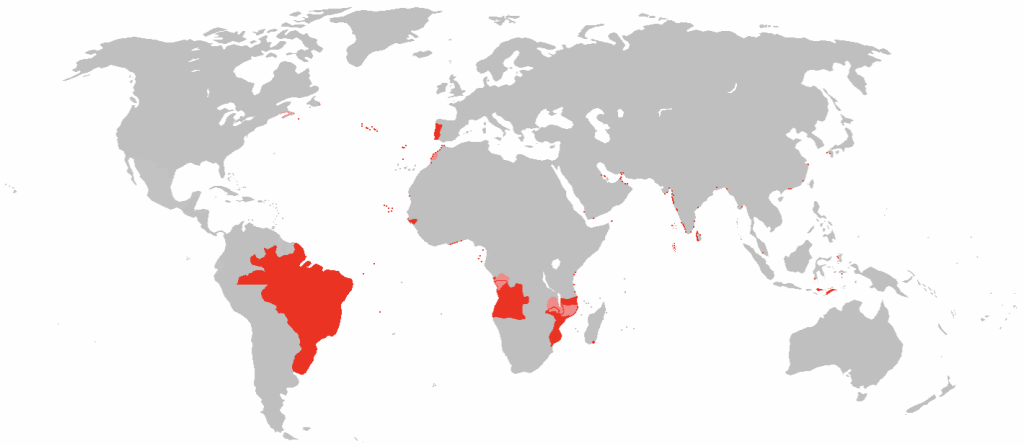At Least 6 Million People Worldwide Have a Claim to Portuguese Citizenship Through Grandparents

Ana Sofia Lamares
Lisbon
From the 15th century onwards, the Portuguese people spread across the globe, establishing maritime routes, colonies, and trading posts on different continents. The Portuguese expansion began with Ceuta in 1415, reaching India in 1498, Brazil in 1500, China in 1513, and Japan in 1543. The Portuguese Empire spread across a vast number of territories that today are part of 53 different countries.

The Camões Institute estimated that 260 million people – that is, 3.7% of the world’s population – speak the Portuguese language, making it the fifth most spoken language in the world, after Mandarin, English, Spanish, and French. Contributing to this number are the Portuguese-speaking countries (part of the CPLP – the community of Portuguese language countries), which include Angola, Brazil, Cape Verde, Guinea-Bissau, Equatorial Guinea, Mozambique, Portugal, São Tomé & Príncipe, and Timor-Leste, occupying 7.2% of the globe’s territory.
How big is the Portuguese Diaspora?
Going back more than five centuries, pinning down a precise number of Portuguese descendants is of course a practical impossibility. But to estimate how many people are eligible for Portuguese citizenship by descent, we need only consider the number of Portuguese descendants up to the second generation, that is to say, how many people worldwide have at least one Portuguese grandparent.
The migratory waves of Portuguese people continued throughout the centuries up to the present day, so much so that the UN and other organizations estimated that more than 22% of Portuguese-born individuals, about 2.3 million people, reside outside the country today.
In addition to these, there is the vast community of the Portuguese diaspora, including spouses, children, and grandchildren of those who migrated over the centuries. Conservative estimates suggest that the number of people in this category exceeds six million.
A 2006 government estimate found that some five million Brazilians had a Portuguese parent or grandparent, all of whom would be eligible for Portuguese citizenship by descent. A further 2 million people in France, 1.4 million in the United States, 1.3 million in Venezuela, and about half a million each in Canada, Angola, and Switzerland are of Portuguese descent, but the statistics don’t indicate by how many generations these are removed from their Portuguese citizen ancestors.
Of course, far more people are of Portuguese descent beyond the second generation (grandchildren). A 2009 study found that the number of people of Portuguese descent up to the third generation (great-grandchildren of Portuguese) numbered more than 31 million worldwide.
What makes Portuguese citizenship valuable?
Portuguese nationality is among the world’s most valuable for at least three reasons:
- Portugal is an EU country, which means citizens of the country can move freely and even settle permanently without the need for a visa or work permit across 30 EU and EEA countries.
- Portugal’s passport, which is only available to the country’s citizens, is among the world’s best travel documents, ranking 4th in the world: It allows visa-free travel to 191 countries and territories.
- Portuguese citizenship provides the option to live in a country with one of the world’s highest standards of living: The country is one of the world’s safest and most peaceful, with an advanced healthcare system, a pleasant climate, and some of the lowest consumer prices in Europe.
How to qualify for Portuguese citizenship by descent
While there are many ways to acquire Portuguese citizenship (the most common is by naturalization, which requires living in Portugal on a residence permit for a certain number of years), those who are entitled to Portuguese citizenship by descent (here meaning without the need for a residency period) are limited to the following categories of individuals:
- Children of Portuguese citizens have the right to Portuguese nationality by descent.
- Grandchildren of Portuguese citizens who prove sufficient knowledge of the Portuguese language also have the right to Portuguese nationality by descent.
Additionally, descendants of Sephardic Jews have the possibility to obtain Portuguese nationality by expedited naturalization. However, as of 2024, qualification for citizenship via this route requires three years of residency in Portugal and thus falls beyond the scope of this article.
What documentation is required to obtain Portuguese Nationality through descent?
- Photocopy of the identification document;
- Birth certificate;
- Birth certificate of the Portuguese relative;
- In some cases, proof of sufficient knowledge of the Portuguese language; and
- Any additional documentation required by Portuguese authorities, which may vary depending on individual circumstances.
To obtain Portuguese citizenship, whether through naturalization or by acquisition, some additional documentation may be required:
- Proof of sufficient knowledge of the Portuguese language;
- Criminal records from the country of birth and nationality and from all the countries where the person lived after the age of 16; and
- Any additional documentation required by the Portuguese authorities, which may vary depending on individual circumstances.
Although, in theory, there are many paths to obtaining Portuguese nationality, in practice, there are other determining factors, such as locating the documents of the ascendant in Portugal and confirming the establishment of filiation in accordance with the Portuguese law in force at the time, the content of the documents, or evidence of connection to Portugal in some cases.
Therefore, after a preliminary analysis to frame the type of process, a careful analysis of the details and documents by an experienced professional is essential to conclude the process successfully.
More on citizenship by descent policies in Europe:
More than half a billion people outside of Europe - chiefly in the Western Hemisphere - potentially have some claim to European ancestry. 18 EU/EEA countries offer citizenship by descent to the grandchildren, great-grandchildren, and in some cases more distant descendants of their citizens. See IMI's Complete List and Map of EU Citizenship by Ancestry/Descent Policies for more information:
Ana Sofia Lamares is a Founding Partner at Lisbon-based law firm Lamares, Capela & Associados.


